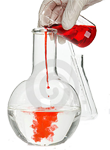
An electronic guide to some of the best ways to study
Experiments

|
Experiments are the bedrock of most sciences. Doing experiments yourself is an essential skill that will deepen your understanding. |
-
- 5.1 Be aware of the safety rules, fire exits etc. before you start!
-
5.2Practicals are designed to help you
- understand and underpin theoretical material
- obtain vital practical skills and familiarity with apparatus
- experience a range of experiments and techniques
- develop and improve your experiment-planning methodologies
- develop objective recording skills
- develop a self-critical approach to drawing conclusions from data
- obtain the ability to communicate the experiment clearly
- discover new ideas for yourself!
Most disciplines issue their own guidelines on practicals. They are often required by the module and you may not be able to pass the module as a whole without passing the practical components. Do all the practicals required. If you miss a practical for any reason, make sure the module leader knows.
- 5.3 Be clear about the objective of the experiment and the methodology before starting it. Get to practical on time, and listen to the instructions. If you do not, the lecturer may not allow you to attempt the practical at all on safety grounds.
- 5.4 Eliminate as many variables as you can e.g. keep the temperature constant.
- 5.5 If some variables cannot be eliminated, you should consider using a control group or control experiment. You may need to repeat the experiment many times to get statistically meaningful results. For experiments which will take a lot of time, you should consult your (statistics) lecturer for advice on how best to carry out the experiment, collect the data, analyse it and display it in your report.
-
5.6 Ask your lecturer about the format required for the write-up. Most departments issue their own guidelines on writing-up and keeping laboratory logbooks. As a general guideline your write-up should have:
- your full first name, SURNAME, student id number and the date of the experiment
- a title
- a brief summary of the experiment (ask if this is required)
- a statement of the objective
- a description of the apparatus (usually including diagrams)
- a description of the method (sometimes including diagrams or flow charts)
- a record of the results and repeated results as a table of raw data and/or graphs, charts etc. of processed data - ask what is required.
- It is an excellent idea to plot the results as you do the experiment, so that you can repeat any suspect results and fill in any data gaps in your graph. What sort of graph should you plot?
 Related topic.
Related topic. - You must include suspect results in the data and mention them explicitly in the text. Do not suppress them - they may indicate unsuspected behaviour which is actually correct. Try to explain their likely cause(s).
- All results should be quoted to a meaningful level of accuracy (sig. figs) - do not quote the answer from your calculator to e.g. 6 places unless the experiment really is that accurate. You must therefore carry out an error estimation of all readings taken and learn how errors combine when using experimental results in formulae.
- a conclusion
- an appendix of raw data (ask if this is required)
- references (ask if these are required).
- 5.7 Cheating and plagiarism are never acceptable. If an experiment does not work or looks suspect, ask your lecturer what to do. Do not fudge the results, borrow someone else's data, make it up etc. You will certainly be discovered and get zero marks (or worse!). You are, however, encouraged to compare your results with other students doing the same experiment to see what you can learn.